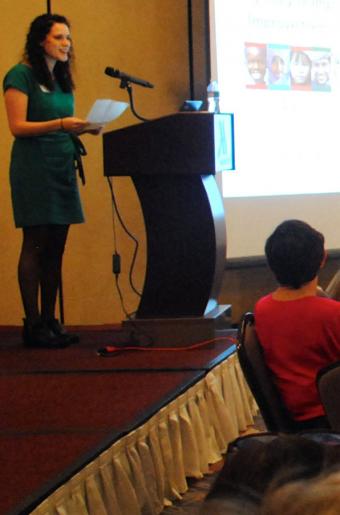PROVIDENCE, R.I. [Brown University] — On Thursday, Oct. 2, 2014, Brown's TRI-Lab (Teaching, Research and Impact) program brought together more than 200 scientists, policymakers, teachers, and child care professionals for a symposium aimed at improving the health, educational performance, and well-being of Rhode Island’s children. The day-long symposium, which included panel discussions and research presentations, focused on how young children develop the executive function skills that enable them to pay attention, follow instructions, apply what they’ve learned, and discover how multiple facts interrelate. Adele Diamond, an international expert on child development and education issues and a cognitive neuroscientist at the University of British Columbia, delivered the symposium's keynote address.
Healthy early childhood development was the topic of TRI-Lab's pilot lab. Faculty and students who participated in that lab put together a policy brief, which was presented at the Oct. 2 symposium, on the importance of supporting the development of executive functions in young children. The briefincludes policy recommendations for accomplishing this in Rhode Island and beyond.
The symposium was jointly sponsored by several of the core participants in the inaugural lab, including Brown University, Rhode Island KIDS COUNT, and Ready to Learn, Providence.
Stephen Buka, professor and chair of the Department of Epidemiology at Brown’s School of Public Health and researchers involved in the pilot lab, commented on the importance of executive function skills in a press release: “An impressive body of research has demonstrated how early acquisition of these skills influences later mental and physical health, school success, and success in the work place. New research by Dr. Diamond, faculty, students, and practitioners in Rhode Island provide exciting new insights into how these skills can be enhanced — or delayed — depending on opportunities and experiences during the preschool years.”

